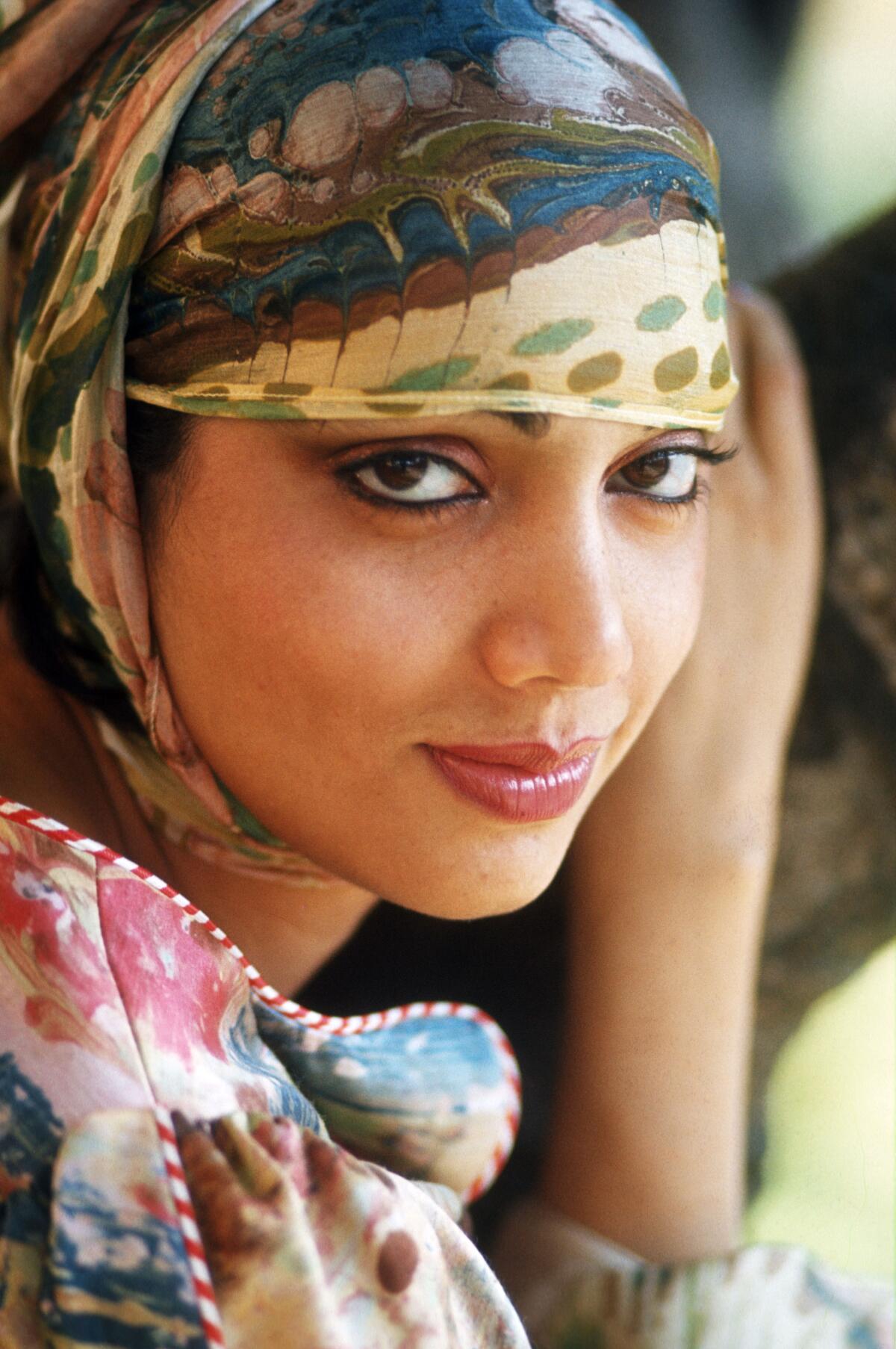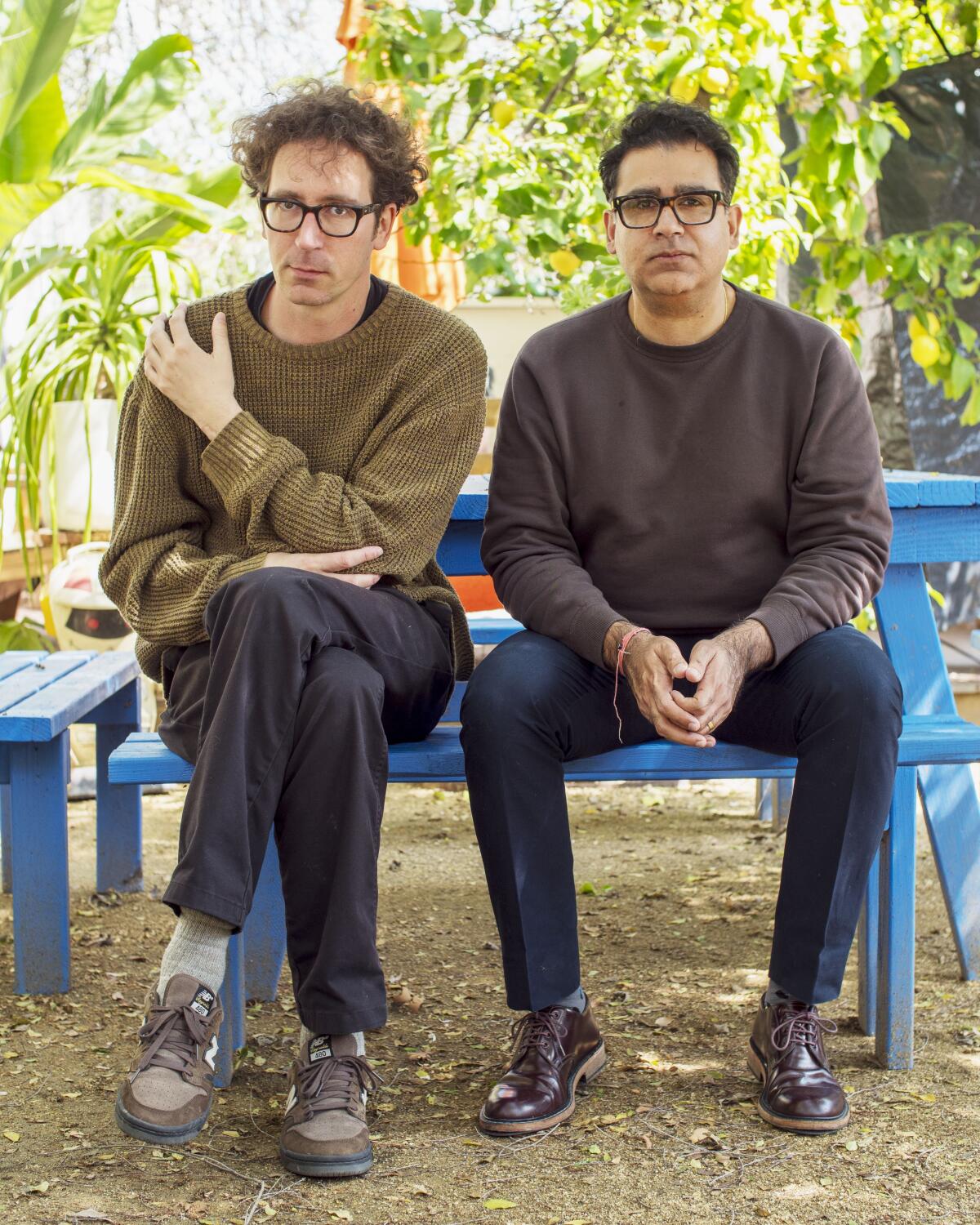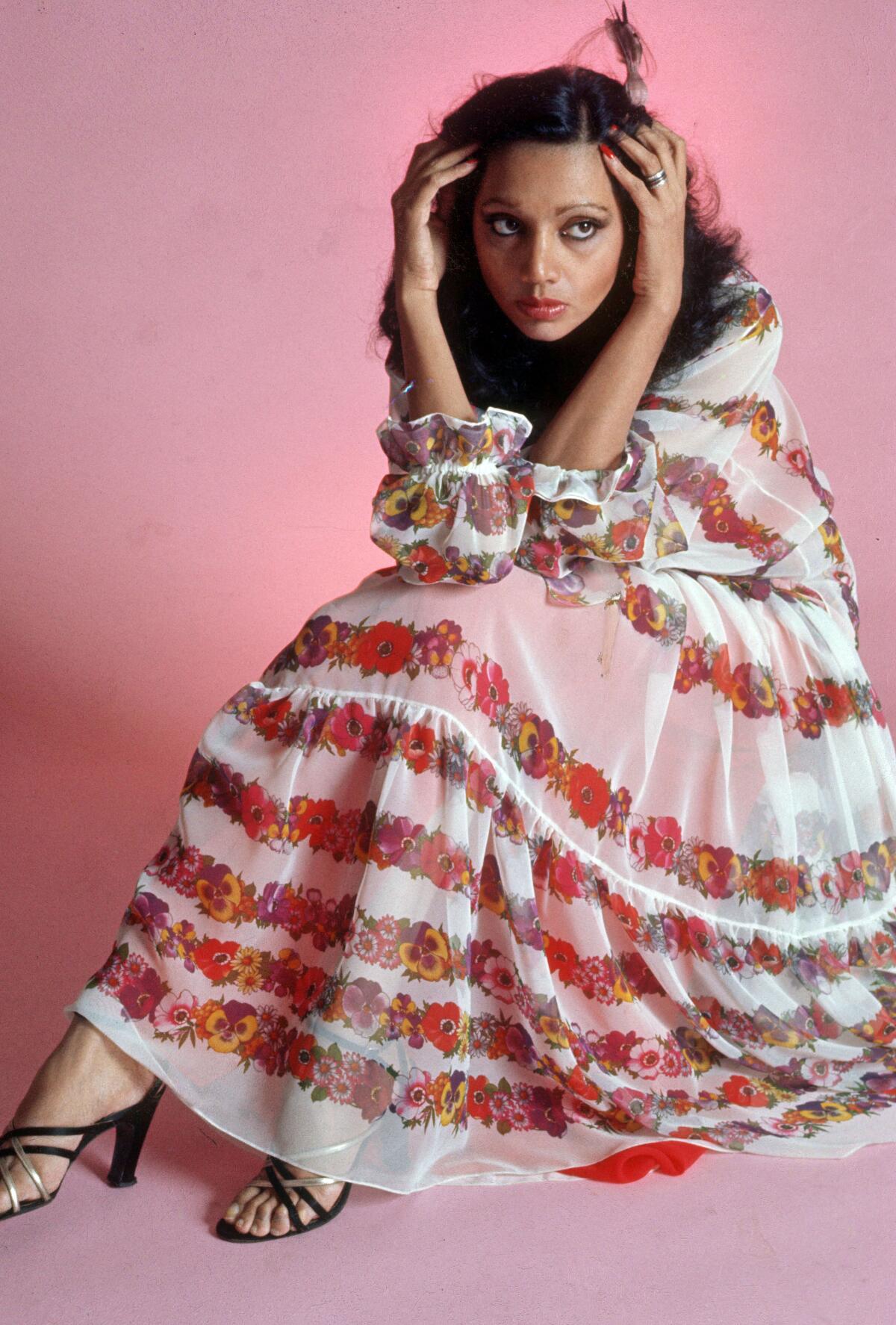For months, Indian vocalist Asha Puthli has hauled a suitcase-size portable karaoke machine out of her condo in West Palm Beach, Fla. The septuagenarian lifts it onto a minibus that takes her to the recreation room at her retirement complex, where she sets up the machine — a gift from her new record label — to rehearse from her catalog to an empty hall.
“It was pretty tough to find a big-enough machine that I could still take to the clubhouse,” she laughed. “I went to one karaoke club in Palm Beach. They had all the standards on there, but, of course, they didn’t have any of my songs.”
Puthli’s career has taken her through smoky Mumbai jazz clubs and a hippie camp at Woodstock; dishing with Andy Warhol and being dressed by Halston and Manolo Blahnik as she sashayed through Studio 54 in New York City. She’s sung with sax giant Ornette Coleman and battled Sean “Diddy” Combs over unlicensed sampling.
She’s also struggled financially at times and hasn’t toured in 40 years. Although she lived in Los Angeles for five years in the 2010s, Puthli has never played here. Until Thursday, that is, when she’ll finally headline a sold out show at the experimental L.A. music club Zebulon.
The show is a very-late-career laurel for an Indian artist who has entranced and defied music industries on three continents for decades. Her life and music embody the fascinated, fraught exchanges of pop culture between Asia and the West.
After an adoring re-mix project from an L.A. indie label devoted to lost South Asian pop, the 79-year-old Puthli is no longer ahead of her time.
“The Beatles took that Indian influence and brought it back to the West,” Puthli said. “But back then, you didn’t see many Indian artists saying, ‘Hey, it’s a two way street. You have influenced me too.’”
“There were certain traditional expectations, such as having an arranged marriage,” Asha Puthli said. “But I was pretty adamant to do what I want.”
(Myung J. Chun/Los Angeles Times)
On the verdant back patio of a Silver Lake home (also the office for Naya Beat, the micro-indie label that’s re-releasing and re-mixing Puthli’s catalog), she takes a reporter’s hand and gingerly walks up the stairway to get her portrait taken. She laughed about the anti-glamorous shot that photographer Richard Avedon took for her 1975 LP “She Loves to Hear the Music.” But on this day, Puthli posed with the same poise she learned in her classical Indian and Western dance training.
“She was always the poster child of ‘I can’t believe all this happened’,” said Raghav Mani, Naya Beat‘s co-founder. “That she wasn’t a household name, even in India, it’s kind of insane.”
“The definition of a star is someone you want to help,” said Douglas Mcgowan, who runs A&R for the Numero Group label, and who was putting up Puthli at his home while she rehearsed for her tour. “She’s a star.”
Puthli’s life embodies pop music in the post-colonial world, with all its promise and incomprehension. Raised in then-Bombay by traditional parents (her father participated in Mohandas Gandhi’s “Salt March”), she studied Hindustani classical music, yet was captivated by jazz, performing in local clubs with her back to the audience to stay discrete. She was a proto-hippie in her own country, traveling to rural villages to see India’s wild diversity.
“There were certain traditional expectations, such as having an arranged marriage,” she said. “But I was pretty adamant to do what I want.”
A New Yorker writer, Ved Mehta, met her on a reporting trip. “Asha is a beautiful, mercurial girl, just out of the university, who has applied for a job as a … air hostess simply in order to go to London and hear a real jazz vocalist, and perhaps become one herself,” he wrote in the essay “Jazz in Bombay,” published in his 1970 book “Portrait of India.”
After landing a scholarship to study with the Martha Graham Dance Company in New York, Puthli trekked to the Woodstock festival in 1969 with a flower-power crew. She befriended the New York downtown demimonde, including Warhol. She recalled pitching him an idea for saucy LP art. (“He said ‘What do you plan for your album cover?’ I said ‘Maybe a man’s crotch with a zipper, and you pull a pink vinyl out of it.” A few years later, Warhol used it for the Rolling Stones’ LP “Sticky Fingers.”)
She was roommates with Holly Woodlawn, the trans actress name-checked on Lou Reed’s “Walk on the Wild Side.” Mehta connected Puthli with John Hammond, a record producer for Billie Holiday, Aretha Franklin and Bob Dylan, who signed her to CBS. The company’s then-president, Clive Davis, didn’t get her. “He said, ‘No, it’s jazz, It won’t sell,’” Puthli recalled.

“I don’t feel like a stranger in any country,” said Asha Puthli, seen here in an archive photo. “But the industry made me feel like an outsider. It was a kick in the gut.”
(Asha Puthli)
When she sang on Coleman’s 1972 LP “Science Fiction” — keening improvisation cutting through a ferocious band — the sax legend gave her a warning about America.
“He said, ‘Asha, don’t even try and be mainstream music. They’ll only accept you when you do Indian music.’ My whole raison d’être was to build the bridge between one of the oldest cultures, India, with the youngest, America. But he was right, of course.”
Puthli cut four albums for various global CBS labels in the 1970s, including her 1976 disco crossover “The Devil Is Loose,” which featured her best known song, “Space Talk.” The sultry number became a favorite cut at David Mancuso’s New York City venue the Loft and later a crate-digger goldmine for rap producers (it’s the backbone of G-Unit’s “The World.”).
But label marketing executives insisted she had a problem. As a South Asian singer in a largely Black and white music industry, who was her audience?
“CBS did a focus group studying whether I would sell in America,” she recalled, acidly. “They said, ‘You’re not going to sell to the whites, you’re not going to sell to Black people.’ They said the Indians living in America liked Indian film music.
“I don’t feel like a stranger in any country,” Puthli added. “But the industry made me feel like an outsider. It was a kick in the gut.”
Puthli never disappeared entirely, but she gave birth to her son Janu and bounced among smaller labels in the ’80s, her career slowed down. She ran a PR agency and helped launch the Green Cross environmental group with former Soviet leader Mikhail Gorbachev in 1993. She’d make occasional festival appearances — she played Central Park SummerStage in New York in 2006 — and fought for her legacy.
She recalled Diddy sampling “Space Talk” for the Notorious B.I.G.’s “The World Is Filled…” without permission. She tracked him down at a party at the L.A. restaurant Crustacean and sent Janu after him with her CD. She said Diddy threw it out a car window.
“What infuriated me was not that he had sampled my music but that he treated my son like that,” Puthli said. “I’m a lioness. How dare you?” (She said they settled out of court).
Her reputation as an unsung pioneer of South Asian pop music grew in the underground, though. Several reissue labels tried to compile her catalog but her master recordings and isolated instrument tracks were on unmarked hard drives buried in her home in Florida. Asha Puthli was a star who needed help.

“I don’t think Indians really knew what to make of her,” said Raghav Mani, right, with Filip Nikolic of the record label Naya Beat. “It was unheard of for any South Asian woman to do what she did.”
(Naya Beat)
In 2021, Mani and Filip Nikolic, a former member of the L.A. disco group Poolside who performs as Turbotito, started Naya Beat, a re-issue and remix label focused on reviving ambitious pop from the subcontinent. They’d included a Puthli track, “Chipko Chipko,” on their debut compilation.
“I don’t think Indians really knew what to make of her,” said Mani, who is of Indian descent. “It was unheard of for any South Asian woman to do what she did. At the time, through the lens of the Beatles and Ravi Shankar, it looked like Indian musicians were all sitting on top of a rock meditating and playing sitar. It’s hard to break through that mold even today, and she did that 50 years ago.”
Nikolic had worked ”Space Talk” and other tracks into his DJ sets, struck by how good the records still sound today. “‘Space Talk’ has such a sick baseline,” he said. “A classic. And with ‘Chipko,’ we thought it was just kind of a Michael Jackson cover, but it’s about the Indian environmental movement.”
They persuaded Puthli to give them a long weekend to comb through her house to find the master recordings to her albums, with an eye toward a bigger release.
“It felt like an archaeological trip. It was crazy the amount of stuff she had on 40 hard drives,” Nikolic said. “I think they’d been protective about it all. It was a battle to convince them that we can be trusted and we’re here to help.”
Last year, Mani and Nikolic’s digging culminated in “Disco Mystic: Select Remixes Vol. 1,” the first of an anthology of Puthli remixes, featuring dance music legends like Maurice Fulton and Dimitri From Paris, alongside younger acts like Psychemagik, Jitwam and their own edit of Puthli’s “One Night Affair.”
The EP sold out of two pressings. The pair weren’t alone in thinking Puthli was due for a revival: In 2022, Raveena, an Indian American R&B singer, named her Warner Music debut album “Asha’s Awakening” and featured Puthli on the song “Asha’s Kiss.”

“There is this second and third generation of children of Indian immigrants, which was not there when I was making music,” said Asha Puthli, seen here in an archive photo. “They’re now in their 20s or 30s or 40s. They’re the ones who can still hear me. “
(Asha Puthli)
“There’s finally a kind of a prominence of South Asian artists,” Mani said. Movie fans proved they’ll watch uncompromised, gonzo Indian films like “RRR” and flock to see artists like Jai Paul and Nav at Coachella. Along the way, Mani said, “They’re finding out about Asha’s story for the first time, and there’s this incredible kind of a-ha moment. It’s a compelling full circle of her music regaining popularity, but also restoring her legacy.”
Puthli, meanwhile, has to prep for a formidable tour schedule, including a stop at the Glastonbury festival in the U.K. in June and a run of Australian dates.
“When people ask me how I’m preparing, I’m preparing by going from doctor to doctor,” she laughed. “At my age, that’s what we do.”
This record and tour are by no means a last valediction to her music career. Now that the music world has re-discovered Asha Puthli, she wants to make up for lost decades.
“I love these small venues, but I want to do the Hollywood Bowl. I want Grammys, keep it coming,” Puthli laughed. “There is this second and third generation of children of Indian immigrants, which was not there when I was making music. They’re now in their 20s or 30s or 40s. They’re the ones who can still hear me.“


